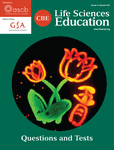Overcoming the Barrier to Implementing Authentic Research Experiences through Faculty Mentorship
To the Editor:
The American Association for the Advancement of Science’s Vision and Change report called for authentic research experiences for all undergraduate biology students specifically for the purpose of training students to gain the skills required to face, and solve, our current and future problems (American Association for the Advancement of Science, 2011). However, such experiences are rare, particularly in introductory biology courses. Spell et al. (2014) recently put forth the results of a national survey in which instructors reported that undergraduate students in introductory biology courses spend on average only one-third of their time on authentic research activities, with 23% of courses having no research and 56% spending less than a quarter of total class time engaging in research. Instructors in their study also reported that the amount of time required to develop research experiences was the most common barrier to implementing them, regardless of institution type (Spell et al., 2014).
We suggest that forming mentoring partnerships between instructors who have already developed research experiences and instructors who wish to do so is an effective way to overcome the time barrier. We formed such a partnership and found it saved time otherwise spent reinventing the wheel and also offered benefits such as encouragement, accountability, example (shared) instructional materials and assessment tools, pedagogical strategies to enhance student engagement in primary literature and writing skills, and camaraderie.
We (a four-year university mentor [J.S.M.] and a two-year college mentee [C.M.G.]) launched our partnership in 2014, meeting monthly by means of various technologies (phone, video conference, and Skype). During the initial meetings, J.S.M. mentored C.M.G. in the framework of the guided inquiry–based research model created by J.S.M. We then identified a semester and course in which C.M.G. would implement the research model, and we developed an overall timeline and schedule to achieve this goal. We worked together to adapt the model to work within a two-year college nonmajors biology course. Each meeting involved the sharing of progress reports and the creation of future action plans. J.S.M. also shared course materials, discussed personal experiences, and taught C.M.G. how to use particular assessment tools and teaching strategies. By the end of the partnership, C.M.G. had successfully implemented the guided inquiry–based research experience in a nonmajors biology course.
This partnership was initiated following J.S.M.’s presentation at the 2013 National Association of Biology Teachers annual conference. As an audience member during the presentation, C.M.G. identified J.S.M.’s research experience model as one that she wanted to implement in her own course and reached out to J.S.M. for guidance. This example highlights the importance of live meeting venues where instructors can share and present research experience models they have developed and implemented with success. These types of presentations most often occur at professional society meetings, making these meeting venues the ideal setting to promote the formation of professional mentoring partnerships. Special symposia could be developed for the specific purpose of bringing together potential mentors and mentees. Instructors who are willing to serve as mentors would have the opportunity to briefly present their research experience model to an audience of instructors who are seeking mentorship.
As we found in our partnership, research experience models do not always transfer smoothly from one institution to another. For example, C.M.G. could not directly implement J.S.M.’s research topic, which was developed within a four-year university because the necessary equipment and infrastructure was not available at C.M.G.’s two-year college. Even in its adapted form, the research experience model required the purchase of additional equipment and supplies. Therefore, to effectively facilitate the transfer of successful research experience models, grant programs could be developed to provide funding for equipment and supplies needed to transfer successful research experience models to a variety of courses and institutions.
We assert that a mentoring partnership is an effective way to overcome the barrier of time on the side of the mentee. However, this is not the case for the mentor. Mentoring requires time, patience, and a willingness to share materials. To make the mentoring role more meaningful and worthwhile, it should be validated and included within promotion and tenure policies as professional development and as service to the educational community. Exemplars, showcased in feature articles in biology peer-reviewed education journals, would validate the importance of this service and allow mentors and mentees the ability to professionally reference their work. In closing, professional mentoring partnerships may be an important catalyst for increasing authentic research experiences in all biology courses nationwide while working to infuse the directives of Vision and Change at the institutional level and properly acknowledging a core academic and commonly understated ingredient, mentorship.
ACKNOWLEDGMENTS
We thank Melissa Coyle for her role in helping to develop the guided inquiry–based research laboratory model at Penn State Lehigh Valley, for providing expert lab technical support, and for helping to coordinate the mentoring partnership logistics.



